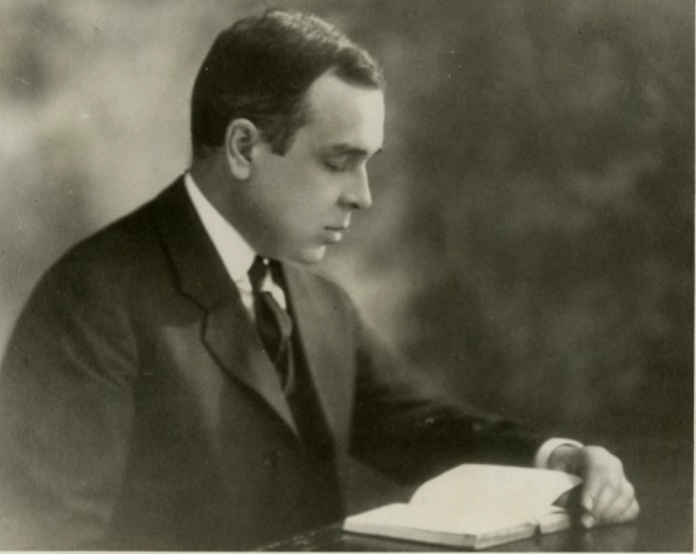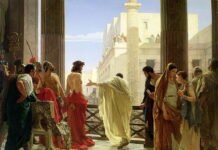This year is the centennial of J. Gresham Machen’s magnum opus, Christianity and Liberalism.
Originally published in 1923, Machen wrote the book in response to a rising tide of theological liberalism and modernism in the United States. Machen’s views ultimately led him out of his denomination and out of Princeton Seminary, both of which accepted more liberal and modernist tendencies, and led him to help found two enduring institutions—Westminster Theological Seminary (1929) and the Orthodox Presbyterian Church (1936).
While Machen’s achievements are chiefly theological, he wrote and spoke extensively about education, where he observed some of the deteriorating effects of liberalism. One hundred years of policy and research have proven Machen prescient in his views on education policy, which can largely be grouped into three themes: resistance against standardization, opposition to centralization, and insistence on parental choice.
Resistance Against Standardization
First, Machen resisted trends to standardize both the teaching profession and student learning. The Lusk Laws in New York, for example, required teachers to obtain certification from the commissioner of education and made them subject to state visitation. Though repealed in 1923, less than two years after they passed, the spirit of the Lusk Laws endures. Nearly every state requires teachers to obtain some certification, often in addition to holding a degree in the field of education, despite the fact that research fails to document evidence of a meaningful link between certification and teacher quality.
Machen believed the modernist trend of training teachers in the science of education, rather than with content in their disciplines, marked a fundamental shift in the understanding of what teaching is. He lamented that the primary preparation of modern teachers was not “to study the subject that he is going to teach. Instead of studying the subject that he is going to teach, he studies ‘education.’”
In Machen’s view, the great danger in standardization and in emphasizing methodology over content is that it would place the child “under the control of psychological experts, themselves without the slightest acquaintance with the higher realms of human life, who proceed to prevent any such acquaintance being gained by those who come under their care.”
Treating education as a mechanistic process would result in “intellectual as well as moral decline” because in such a context, morality is based “upon experience, instead of upon an absolute distinction between right and wrong,” Machen said in a 1926 address to the Sentinels of the Republic, a libertarian organization dedicated to resisting federal overreach.
To compensate for the meagerness of character formation in modern education, psychological experts instead try to inject civic and moral values into a standardized, secularized curriculum. Machen wrote about such “morality codes” in a 1925 essay titled “Reforming the Government Schools.” He observed that these codes were “making the situation tenfold worse; far from checking the ravages of immorality, they are for the most part themselves non-moral at the root.” Today, morality codes have many faces, but the same empty core. Social and emotional learning (SEL), for example, provides analogs for cardinal virtues promoted by classical and Christian education, but absent the thick moral context of religion.
Opposition to Centralization
Machen was also opposed to the centralization of oversight of education in the federal government, a natural extension of his resistance to standardization. In February 1926, a month after his Sentinels address, Machen provided expert testimony on behalf of the Sentinels for a Congressional hearing dealing with several issues, including the formation of a federal Department of Education, which he predicted that if enacted, would be “the worst fate into which any country can fall.” While he helped defeat the proposal for a federal department, his victory was merely temporary, as a federal department of education would eventually be formed as a cabinet-level department in 1980.
Machen was not being hyperbolic in his assessment. Since the establishment of the first federal agency in 1867, which started with only a commissioner and a staff of three, the federal role in education has ballooned. For 2023–24, the Department of Education budgeted over $270 billion in spending—all the more alarming when one considers that the Department of Education accounts for only three-fifths of all federal spending on education. Again, Machen has been vindicated by research, which has failed to document a reliable link between spending and student outcomes.
A common argument for centralized control over education, both in Machen’s day and today, is easily addressed. The notion that the government must control education in order to inculcate desirable civic values in its citizenry—“that the children belong to the State, that their education must be provided for by the State in a way that makes for the State’s welfare,” as Machen described to the Sentinels. Yet the irony of this principle is that, though intended to prepare students to live out their civil liberties, it “is inimical at every step to liberty.” Research comparing the civic outcomes of private schools and public schools consistently documents a private school advantage with respect to political knowledge, civic engagement, and other civic outcomes. The “personal, free, individual character of education” could not be preserved under centralized control.
Private school leaders often identify the looming threat of future regulations as a reason for not participating in private school choice programs.
Insistence on Parental Choice
If the government should not oversee education, who then should oversee a child’s education? For Machen, the answer was unequivocally the child’s parents.
Machen was a highly educated individual. He studied Classics at Johns Hopkins University, philosophy at Princeton University, and theology at Princeton Seminary. He also spent time studying abroad at universities in Marburg and Göttingen in Germany before accepting an academic post at Princeton Theological Seminary. Yet for all his training and experience with education, he thought most of the influence of his parents, and particularly his mother, on his training. “I did not get my knowledge of the Bible from Sunday School or from any other school, but I got it on Sunday afternoons with my mother at home.”
So precious is the relationship between parents and their children that Machen stated, “If you give the bureaucrats the children, you might just as well give them everything else.”
Efforts to undermine parental control of education were already in progress at the time Machen was writing Christianity and Liberalism. In Oregon, the Compulsory Education Act (1922) required children to attend public school. Many religious organizations objected to the law on the grounds that it took away parents’ right to enroll their children in religious private schools, threatening to “wip[e] out of existence” Christian schools and private schools. While many Protestants supported these and other anti-Catholic education measures, Machen provides a notable example of a Protestant public intellectual who favored religious liberty in education, even for groups outside of his personal faith.
The Supreme Court’s unanimous ruling in Pierce v. Society of Sisters in 1925, two years after the publication of Christianity and Liberalism, protected the parents’ right to make decisions about a child’s education. Machen would reference the majority opinion of the court in his 1926 Sentinels address, “As Justice McReynolds said in the great decision in the Oregon school case, the child, in America, is not the mere creature of the state—a great principle which I think includes all that we are here endeavoring to maintain.”
Machen argues for parental choice on principle, but empirical research supports the claim that parents ought to have greater agency over their child’s education. The weight of evidence on parental school choice for both private and public choice concludes it improves student learning outcomes. Beyond the classroom, attending a parent-preferred school improves long-run outcomes including health and labor market outcomes, even when controlling for student test scores and school quality. These findings may be related to the fact that, though parents may differ as to their top reason for choosing a school, they invariably value student learning and academics. Parents of private Christian school students, for example, prioritize spiritual formation when choosing a school, but consider academic quality nearly as highly.
Education Policy Today
The year of Machen has also been the year of universal school choice, with seven state legislatures passing new school choice bills and ten states expanding existing programs. Eight of these programs have universal eligibility. Given Machen’s views on standardization, centralization, and parental choice in education, how would he feel about reforms in education policy today?
Read it all in Law & Liberty



